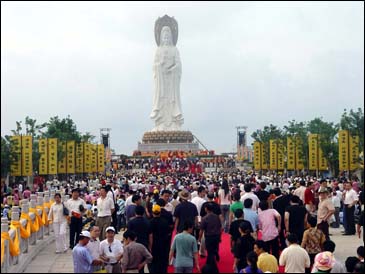Theme park devoted to Guanyin
The Standard (Hong kong), July 11, 2005
Nanhai, China -- Taiwanese investors are betting that devotion to a beloved Buddhist saint will be enough to bring a million tourists a year to a theme park built around two temples in a city deep in China's interior that doesn't even have its own airport.
 << Worshippers throng the 108-meter Guanyin in Nanhai, Zhejiang province, at its opening in April, auguring well for the theme park planned for Suining, Sichuan. CNS
<< Worshippers throng the 108-meter Guanyin in Nanhai, Zhejiang province, at its opening in April, auguring well for the theme park planned for Suining, Sichuan. CNS
Religion is fair game for entrepreneurs in China, say tourism experts, so the idea of a theme park dedicated to Guanyin, whose image is as ubiquitous in China as that of the Virgin Mary in the West, won't offend anybody and could well be successful.
In Buddhist teaching, Guanyin is a bodhisattva - a person almost fully enlightened who puts off entering paradise in order to help others attain enlightenment.
''Of all the bodhisattvas, Guanyin is the kindest and most merciful. We hope the theme park will be a reminder to visitors to show compassion to others,'' says Frank Yu, an investor and Guanyin devotee who is president of the Nanshan district of the Taiwan merchants' association of Shenzhen. Guanyin is said to be capable of great transformations that allow her to give comfort and help wherever needed.
Fishermen, for example, pray to a Guanyin who holds a basket of fish, while childless women venerate one with a baby nestling in the crook of her arm.
Some believe she is even capable of multiple simultaneous manifestations. According to one school of thought, Guanyin is actually three sisters. In Suining, Sichuan province, there are temples dedicated to two of them, and Yu and his partners plan to build a theme park around them.
``One legend has it that Guanyin was three sisters. After they grew up, they went their separate ways. The eldest strove for virtue at Lingquan Temple and the second at Guangde Temple, which are both in Suining. The youngest, however, became Guanyin at the Putuoshan, a mountain in Nanhai,'' Yu explains.
Though most Buddhists believe the Guanyin cult originated in Nanhai in the east coast province of Zhejiang, there are some who trace its roots to Suining, whose temples date back 1,400 years to the Tang dynasty.
Plans call for a theme park to be built in Suining in two phases. Work is to begin in 2008 and be completed in 2010. The total cost is estimated at 150 million yuan (HK$141 million).
Suining is short on basic tourism infrastructure. The nearest airport is in the Sichuan capital of Chengdu, about 90 minutes away by road. The first-phase investment of about 71 million yuan, in addition to buying land and compensating expropriated farmers, will go on building a five-star hotel, Yu says. Currently, the city's hotel stock consists of two four-star properties and a total of 500 rooms.
The local government is behind the venture, though, and Suining recently secured a US$30 million (HK$234 million) loan from the World Bank to fund infrastructure improvements.
``We hope to turn the two temples and the surrounding area, about 970,000 square meters of land in all, into a park that can accommodate 50,000 tourists staying for three nights and four days at a time,'' Yu says.
When not visiting the temples, they would be able to shop for antiques and souvenirs, attend live performances and sharpen their video games skills in the cyber entertainment city. The investors say they can attract 200,000 mainland tourists and 800,000 overseas tourists per year. With annual ticket income of 24 million yuan, and three million yuan from food and beverage, entertainment, leisure and retail, they expect to break even after 5½ years.
Song Ding, director of the center for tourism at the China Development Institute, a Shenzhen-based research agency that reports to the State Council, says there's nothing new about investors playing the religious card.
``The `prayer' of these investors is to tap into a potential market of billions of people who live in China or nearby places and who worship Guanyin,'' he says. But success won't be automatic.
``Theme parks are hardly a novelty anymore. There are more than 3,000 of them, small and large, across the country,'' Song says.
``A 108-meter white statue of Guanyin was just unveiled in Nanhai in April. It's very popular because it's located where most people believe Guanyin's true hometown to be. And there's no admission fee either.''
Song says that if Suining wants to draw people who are not Guanyin devotees, it needs other attractions. Yu believes he has that base covered.
``Apart from the historic temples, there are mountains nearby, a long river called Fujiang, and an ancient salt lake in Daying county, known as the Chinese Dead Sea.'' olivia.chung@singtaonewscorp.com

 << Worshippers throng the 108-meter Guanyin in Nanhai, Zhejiang province, at its opening in April, auguring well for the theme park planned for Suining, Sichuan. CNS
<< Worshippers throng the 108-meter Guanyin in Nanhai, Zhejiang province, at its opening in April, auguring well for the theme park planned for Suining, Sichuan. CNS